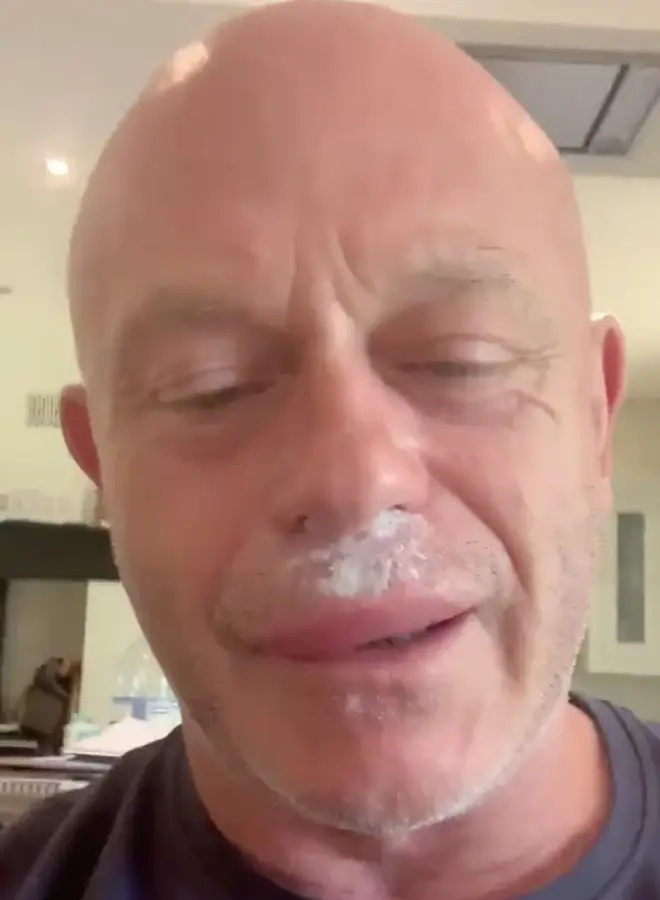
Shelagh Fogarty 1pm - 4pm
4 August 2020, 08:45

TV hardman Ross Kemp has thanked the "fantastic" NHS after they treated him following a wasp attack.
The documentary maker took to Twitter after he was stung around his mouth and nose after disturbing a nest in a loft space on Monday.
In a series of videos posted on social media the former Eastenders actor showed the swelling to his face after being "stung by about three or four wasps in the nasal or lip area."
He joked that he "looked like Mick Jagger" after his face started to swell.
Kemp, who is famous for documentaries in tough environments such as Ross Kemp On Gangs, said doctors had given him hydrocortisone cream to reduce the swelling.
You might think I deserve this...when wasps attack 🤣🤪 pic.twitter.com/bnU0fEk7Dh
— Ross Kemp (@RossKemp) August 3, 2020
Late on Monday evening he said: "Now being seen by our fantastic NHS - local doctor's just giving me a hydrocortisone.
"Hopefully that's going to bring it down a bit."
The actor and presenter also imitated Rolling Stones frontman Sir Mick Jagger's famous lips.
"I look like Mick Jagger, don't I?" he joked.
He then tried to sing the band's hit (I Can't Get No) Satisfaction but admitted: 'Oh, it hurts a bit."
Kemp also issued a warning to his fans about disturbing a wasp nest.
Wasp Kemp...back home, thank you NHS pic.twitter.com/dBLspHFpxG
— Ross Kemp (@RossKemp) August 3, 2020
He said: "That just goes to show what happens with nature.
"I had no idea when I was opening the hatch that there was actually a wasp nest on top of it.
"I am very lucky that they only stung me on my nose, in my nose and my top lip.
"It could have been far worse. Thank you again, you lovely, lovely NHS."
Kemp played Grant Mitchell on Albert Square for more than 25 years, alongside his on-screen mother Dame Barbara Windsor.
The NHS advice to treat an insect bite or sting:
-remove the sting or tick if it's still in the skin
-wash the affected area with soap and water
-apply a cold compress (such as a flannel or cloth cooled with cold water) or an ice pack to any swelling for at least 10 minutes
-raise or elevate the affected area if possible, as this can help reduce swelling
-avoid scratching the area, to reduce the risk of infection
-avoid traditional home remedies, such as vinegar and bicarbonate of soda, as they're unlikely to help
-The pain, swelling and itchiness can sometimes last a few days. Ask your pharmacist about medicines that can help, such as painkillers, creams for itching and antihistamines.
The NHS says you should get medical advice by contacting your GP or calling NHS 111 for advice if:
-you're worried about a bite or sting
-your symptoms do not start to improve within a few days or are getting worse
-you've been stung or bitten in your mouth or throat, or near your eyes
-a large area (around 10cm or more patch of skin) around the bite becomes red and swollen
-you have symptoms of a wound infection, such as pus or increasing pain, swelling or redness
-you have symptoms of a more widespread infection, such as a high temperature, swollen glands and other flu-like symptoms
You should dial 999 for an ambulance immediately if you or someone else has symptoms of a severe reaction, such as:
-wheezing or difficulty breathing
-a swollen face, mouth or throat
-feeling sick or being sick
-a fast heart rate
-dizziness or feeling faint
-difficulty swallowing
-loss of consciousness
Emergency treatment in hospital is needed in these cases.